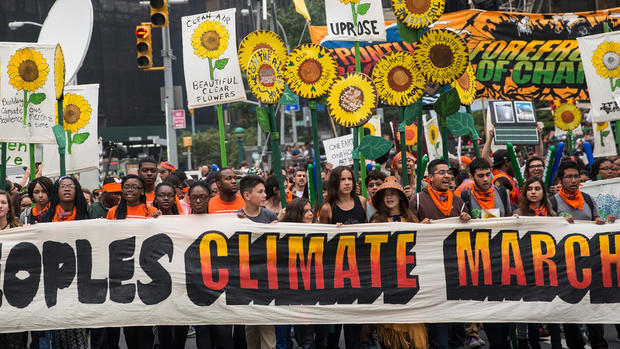Facing resistance at home, Obama urges climate action on world stage
When President Obama addresses the United Nations climate summit on Tuesday, he'll call on world leaders to follow his lead and develop plans to cut carbon pollution.
"The president does hope that the kinds of steps that he has already taken here in the U.S. will serve as a model for significant commitments from leaders of other countries to take similarly important steps to confront the challenge of climate change," White House spokesman Josh Earnest said Monday.
In his six years in office, Mr. Obama has taken a number of significant steps to reduce carbon emissions, like fostering green energy markets with the 2009 stimulus and enacting stricter vehicle-fuel-efficiency standards in 2011. Last year, Mr. Obama rolled out a comprehensive "climate action plan" that should cut nearly 3 billion tons of carbon pollution between 2020 and 2025 and save consumers billions in energy expenses -- when it is fully implemented.
Yet one key portion of that plan -- a proposal to require existing power plants to reduce carbon dioxide emissions by 30 percent from 2005 levels by 2030 -- faces resistance from conservative lawmakers in some states. The proposal, rolled out by the Environmental Protection Agency in June, is one of Mr. Obama's most significant climate-related policy proposals, but some lawmakers say it amounts to a war on coal.
In August, 12 states filed a lawsuit against the plan, and a few weeks later, 15 Republican governors sent Mr. Obama a letter voicing their concerns. Gov. Mike Pence of Indiana said in a statement that the proposal was "ill-conceived, poorly constructed, and will cause significant harm in the states."
Advocates of the new proposal, called the "clean power plan," say they're confident it will be fully implemented. The movement to reduce carbon emissions, they say, has already gained too much momentum.
"That's a subset of conservative governors trying to delay the inevitable and delay action on this," J.R. Tolbert, executive director of the National Caucus of Environmental Legislators, told CBS News. "But I think at the end of the day those decision makers will discover it's an untenable solution."
Tolbert pointed to the more than 300,000 people who marched in New York City over the weekend to bring attention to the threat of climate change, calling that crowd just "the tip of the iceberg."
"The public is standing up and saying we actually need action," he said.
A CBS News/New York Times poll released Monday shows that 54 percent of Americans say global warming is having a serious impact now or will in the future. As many as four in 10 say global warming will be a serious threat to them during their lifetime.
If public opinion isn't enough incentive to act, recent technical innovations making it easier to reduce carbon emissions should help, said Cathy Zoi, a former Department of Energy and EPA official who is now part of a project called the New Climate Economy. The project released a report last week demonstrating how governments can take action on climate change while also fostering economic growth.
"I am hopeful states will see this plethora of tech options at our fingertips, so they'll all get on board," Zoi told CBS News. "It will be a missed opportunity if they don't."
Wind and solar energy are increasingly efficient, prompting investment banks like Citigroup to call this the "age of renewables." Industrial leaders like Tesla are quickly developing more cost-effective cars.
That economic potential will continue to grow with more government support, Zoi argued. Technological developments in the auto industry may outdo the fuel efficiency rules the Obama administration put in place, but "without that signal from government, many companies would've sat on the sidelines," she said.
"The private sector needs a safe haven for capital, and the policy provides that safe haven," she added.
While there's opposition to Mr. Obama's "clean power plan," politicians at the state level have already enacted significant policies to reduce carbon emissions. As many as 38 states have renewable portfolio standards or goals, and 10 states have market-based greenhouse gas emissions reduction programs.
The EPA is still accepting public comments on the plan, and the agency plans to put out a final version of the rule by June of next year.

